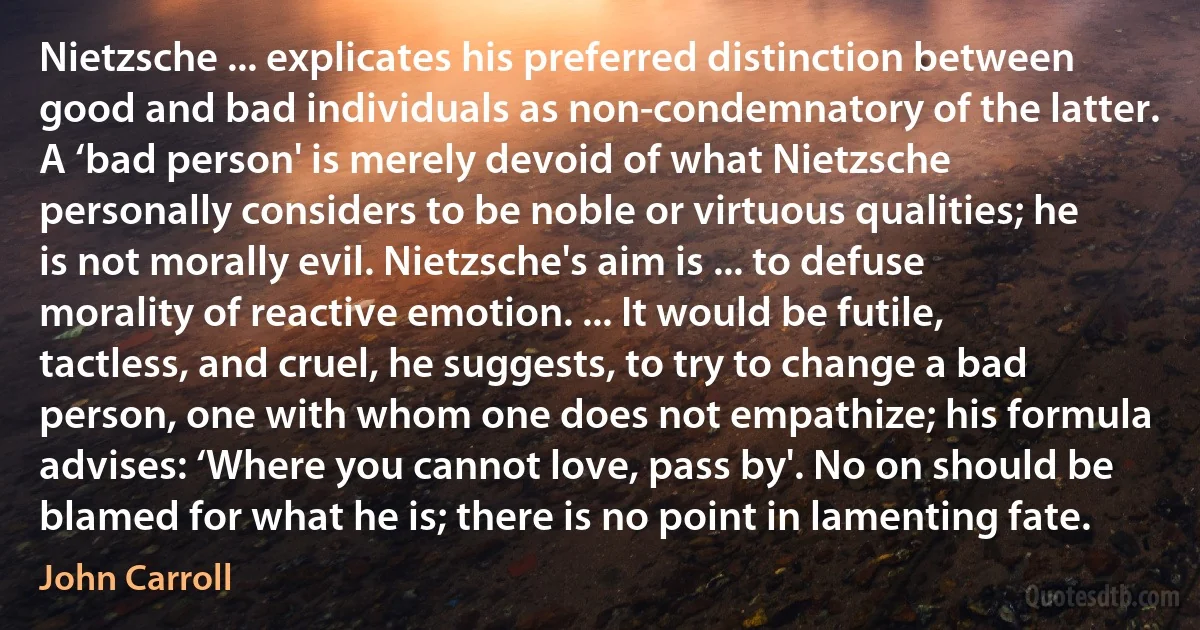
Nietzsche ... explicates his preferred distinction between good and bad individuals as non-condemnatory of the latter. A ‘bad person' is merely devoid of what Nietzsche personally considers to be noble or virtuous qualities; he is not morally evil. Nietzsche's aim is ... to defuse morality of reactive emotion. ... It would be futile, tactless, and cruel, he suggests, to try to change a bad person, one with whom one does not empathize; his formula advises: ‘Where you cannot love, pass by'. No on should be blamed for what he is; there is no point in lamenting fate.
John CarrollRelated topics
aim bad change evil fate good lamenting love noble pass person point should try NietzscheRelated quotes
Watching old movies is like spending an evening with those people next door. They bore us, and we wouldn't go out of our way to see them; we drop in on them because they're so close. If it took some effort to see old movies, we might try to find out which were the good ones, and if people saw only the good ones maybe they would still respect old movies. As it is, people sit and watch movies that audiences walked out on thirty years ago. Like Lot's wife, we are tempted to take another look, attracted not by evil but by something that seems much more shameful - our own innocence.

Pauline Kael
The university is well structured, well tooled, to turn out people with all the sharp edges worn off, the well-rounded person. The university is well equipped to produce that sort of person, and this means that the best among the people who enter must for four years wander aimlessly much of the time questioning why they are on campus at all, doubting whether there is any point in what they are doing, and looking toward a very bleak existence afterward in a game in which all of the rules have been made up, which one cannot really amend.

Mario Savio
If... God highly exalted Christ because He humbled Himself, suffered dishonour, was tempted and endured a shameful cross and death for our sake, how will He save, glorify and raise us up if we neither choose humility, nor show love to our fellows, nor gain our souls by enduring temptation (cf. Lk. 21:19), nor follow the saving Guide through the 'strait gate' and along the 'narrow way' leading to eternal life (Mt. 7:14)? To this end we were called, says Peter, the chief Apostle, ' Because Christ also suffered for us, leaving us an example that we should follow His steps' (I Pet. 2:21).

Gregory Palamas
The man who has struggled bravely with the passions of the body, has fought ably against unclean spirits, and has expelled from his soul the conceptual images they provoke, should pray for a pure heart to be given him and for a spirit of integrity to be renewed within him (cf. Ps. 51:10). In other words, he should pray that by grace he may be completely emptied of evil thoughts and filled with divine thoughts, so that he may become a spiritual world of God, splendid and vast, wrought from moral, natural and theological forms of contemplation.

Maximus the Confessor
Do not do anything without signing yourself with the sign of the Cross! When you depart on a journey, when you begin your work, when you go to study, when you are alone, and when you are with other people, seal yourself with the Holy Cross on your forehead, your body, your chest, your heart, your lips, your eyes, your ears. All of you should be sealed with the sign of Christ's victory over hell. Then you will no longer be afraid of charms, evil spirits, or sorcery, because these are dissolved by the power of the Cross like wax before fire and like dust before the wind.

Cleopa Ilie
